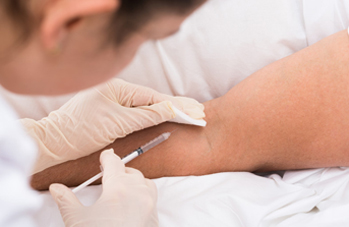Medical records services are significant in vaccine cases because just as other personal injury cases, they rely considerably on medical records which have to be obtained from diverse sources. The information contained therein is crucial to proving that a person received a vaccination and suffered an injury or reaction that was caused by the vaccination. For the medical record analysis and review, the plaintiff has to submit not only all of the vaccination and treatment records, but also the complete set of medical records for three years prior to the vaccination.
How the HHS Deals with a Vaccine Injury Case
In vaccine injury cases, the HHS (Department of Health and Human Services) acts as the defendant and is represented by the Department of Justice (DOJ) attorneys throughout the process.
- The HHS reviews the plaintiff’s petition and determines whether to dispute the claim that the injury was caused by the vaccine or to agree that the vaccine was in fact responsible.
- If the HHS’ decision is to agree that the vaccine caused the injury, their next step would be to determine the value of the damages. If this value cannot be agreed upon, the next step would be a trial (hearing) on the topic of damages before the Special Master (a subordinate official a judge appoints to make sure that judicial orders are actually followed, or to hear evidence on behalf of the judge and make recommendations to the judge as to the nature of the particular case).
- If the HHS does not agree that the vaccine caused the injury, there will be an initial hearing on the issue. This hearing is held at the nearest federal courthouse to where the plaintiff lives.
- The plaintiff doesn’t need to be a U.S. citizen to file a claim. The vaccine must have been administered in the U.S or one of its territories if the claim is to be a valid one.
- Some individuals who receive vaccines outside of the United States may be eligible for compensation. To be eligible, the injured person must have been a U.S. citizen serving in the military or a U.S. government employee, or a dependent of such a citizen; or the injured person must have received a vaccine manufactured by a vaccine company located in the U.S, and must have returned to the U.S. within 6 months after the date of the vaccination.
Some VICP Facts
Though designed to be speedier than civil litigation, vaccine cases sometimes take years to conclude. Usually, a hearing on whether the vaccine caused the injury typically occurs within a year. If the case settles, it may conclude within a year. The injured party is usually paid compensation and this includes financial damages for suffering and pain, medical expenses, lost wages and reasonable attorneys’ fees and costs. There is a maximum of $250,000 for the compensation provided for pain and suffering; there is no limit of compensation for lost wages and medical expenses.
- The VICP (National Vaccine Injury Compensation Program) was established on October 1, 1998 to ensure that an adequate number of vaccines were produced, that the vaccine costs would stabilize, and that a competent and accessible forum was established to provide remedy for people injured by certain vaccines.
- This program is a no-fault alternative to the traditional tort system for resolving vaccine injury claims.
- Three federal government offices play important roles in litigating VICP cases – the U.S. HHS, the U.S. Department of Justice, and the U.S. Court of Federal Claims (the court that adjudicates the claims).
The Legal Malpractice Risk Involved
Unfortunately, many Americans do not know where to go to seek compensation in case of a vaccine injury. Even attorneys seem to have a lack of knowledge of the National Vaccine Injury Compensation Program, and this, as The Legal Intelligencer points out, has led to a dramatic number of legal malpractice cases as well a huge number of unrepresented victims.
Many doctors also seem to be unaware that vaccines can cause disastrous reactions and consequently do not file appropriate adverse event reports, or advise their patients that certain conditions may be caused by the vaccines they had received. They also may not advise their patients regarding the legal rights they may have in case of an adverse event. On the part of the patients themselves, they must give as many details as possible regarding the adverse reaction to their doctors. For the purposes of the vaccine injury compensation program, courts presume that the medical records are complete and accurate. So it is doubly important that all details are given to the doctor so that he/she can record it in the medical chart.
It is vital that attorneys understand that people injured by certain vaccines have an available remedy. They should also clearly know what the applicable statute of limitations is for these remedial actions to prevent being exposed to a legal malpractice suit.
- The statute of limitations in vaccine injury cases are not state specific.
- The jurisdiction of these cases is the U.S. Court of Federal Claims in Washington, D.C., and therefore a global statute of limitations of three years from the first manifestation of symptoms governs all VICP cases.
- In case the vaccine injury case is a death, the statute of limitations is two years from the date of death or four years from the first manifestation of symptoms that led to the death.
- Though created by the National Childhood Vaccine Injury Act, the VICP does not offer the maximum amount of opportunity to minors who may have been injured by vaccines to seek legal action.
Vaccines are life-saving medications, but in rare cases they can prove to be a villain in a small percentage of the population. It is important for attorneys to understand the basic, distinctive statute of limitations requirements for these cases so that they can advise their potential clients regarding the options available.




